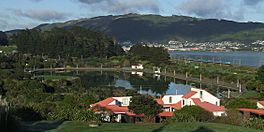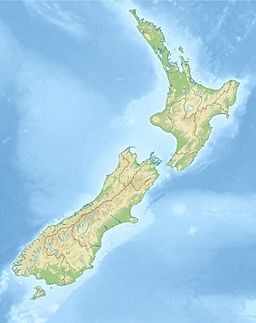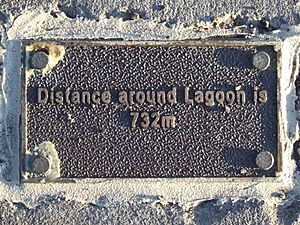Aotea Lagoon facts for kids
Quick facts for kids Aotea Lagoon |
|
|---|---|

A view from the north-east: Pipitea miniature railway station across the lagoon, State Highway 1, North Island Main Trunk Railway and Porirua Harbour to the right.
|
|
| Location | North Island |
| Coordinates | 41°7′12″S 174°51′25″E / 41.12000°S 174.85694°E |
| Type | artificial lagoon |
| Primary inflows | Porirua Harbour and stormwater drains |
| Primary outflows | Porirua Harbour |
| Basin countries | New Zealand |
| Surface area | 5 ha (12 acres) |
| Shore length1 | 732 m (2,402 ft) |
| Surface elevation | sea level |
| Settlements | Papakowhai |
| 1 Shore length is not a well-defined measure. | |
Aotea Lagoon is a special, man-made lagoon in Papakowhai, a suburb of Porirua, North Island, New Zealand. It's surrounded by a large public park that covers about 7 hectares (17 acres).
This lagoon, along with two others nearby, was created a long time ago. This happened when big roads and railway lines were moved from the natural coastline onto land that was made by filling in parts of Porirua Harbour.
About the Water
The lagoon itself is about 5 hectares (12 acres) of seawater. It's connected to Porirua Harbour through a pipe called a culvert, which goes under a model windmill.
Water from stormwater drains also flows into the lagoon. There are two drains on the east side and one on the south-east side.
The water in the lagoon doesn't get cleaned out very well. Because of this, the water quality isn't good enough for swimming, so swimming is not allowed here.
How Aotea Lagoon Was Made
Long ago, in the early 1960s, the main railway line (called the North Island Main Trunk) and State Highway 1 used to curve around three bays between Porirua and Paremata.
To make the railway line straighter, a raised road or track, called a causeway, was built. This causeway connected different points along the coast. When the causeway was built, it cut off the bays from the sea, and these bays then became lagoons.
Later, to make space for the highway, parts of these new lagoons were filled in. The material used for filling came from nearby construction sites.
In 1980, the area around the middle lagoon was turned into a public park. This was a big project involving the Ministry of Works, Porirua City Council, a program that helped people find work (called the Project Employment Programme), and local community groups. The park was named Aotea Lagoon. The City Council officially took over running the park in 1994.
Fun Things to Do at the Park
The main feature of the park is a path that goes all the way around the lagoon. It's a great place for a walk or a run!
One of the most popular attractions is a miniature railway. It's a quarter of the size of a real train and has a track that's 833 metres (2,733 feet) long. The track goes over two bridges and through a tunnel! You can ride the train on Sunday afternoons, if the weather is good. The train leaves from Pipitea Station, which is south-west of the lagoon.
The park also has big grassy areas on three sides, and some even have barbecues where you can cook. Other cool things to find in the park include:
- Playgrounds for both older kids and toddlers.
- A duck pond with a boardwalk crossing it, perfect for feeding the ducks.
- A splash pad for cooling off.
- An island you can reach by a bridge.
- A Pétanque area for playing games.
- A beautiful rose garden.
Most people visit Aotea Lagoon to get some exercise or just relax. Kids especially love the playgrounds, feeding the ducks, riding their bikes, and, of course, riding the miniature train!
 | Calvin Brent |
 | Walter T. Bailey |
 | Martha Cassell Thompson |
 | Alberta Jeannette Cassell |



